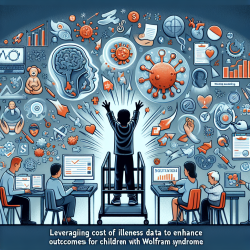Stuttering, a complex fluency disorder, has been the focus of extensive research and therapy within the field of speech-language pathology. One intriguing aspect of stuttering is the discrepancy often observed between the perception of stuttering events by listeners (including clinicians) and by the speakers who stutter. A landmark study, "A Comparison of Listener and Speaker Perception of Stuttering Events," sheds light on this discrepancy, offering valuable insights for practitioners aiming to refine their therapeutic approaches.
Understanding the nuances of how stuttering is perceived can significantly enhance therapeutic strategies. This study compared judgments of stuttering made by persons who stutter (PWS) with those made by independent listeners. The findings revealed a significant correlation between speaker judgments of stuttering and highly agreed upon listener judgments, yet highlighted a notable difference in the perception of stuttered words.
Listeners and speakers showed high agreement on nonstuttered words but low agreement on stuttered words. This discrepancy underscores the complexity of stuttering perception and suggests that traditional listener-based assessments may not fully capture the speaker's experience of stuttering.
Implications for Practitioners
The study's findings have several implications for speech-language pathologists (SLPs) and others involved in the assessment and treatment of stuttering:
- Emphasizing Speaker Self-Perception: Given the significant correlation between speakers' judgments of their stuttering and the perception of listeners, therapists should place greater emphasis on the PWS's self-perception. This approach can aid in developing more personalized and effective treatment plans.
- Refining Assessment Techniques: The discrepancy in identifying stuttered words suggests a need for refining assessment techniques. SLPs should consider incorporating both speaker self-reports and listener judgments to gain a comprehensive understanding of the stuttering severity.
- Encouraging Further Research: The study highlights the need for further research into the speaker's perception of stuttering. Exploring this aspect can lead to the development of new assessment tools and therapeutic interventions that are more aligned with the PWS's experiences.
- Training for Clinicians: The findings underscore the importance of training clinicians in recognizing the subjective nature of stuttering. Enhancing clinicians' awareness of the potential discrepancies in stuttering perception can improve diagnostic accuracy and therapeutic outcomes.
Advancing Stuttering Therapy
By integrating insights from this study into clinical practice, practitioners can enhance the effectiveness of stuttering therapy. Emphasizing the speaker's perception of stuttering, refining assessment techniques, and encouraging further research are crucial steps toward advancing stuttering therapy. As we continue to explore the intricacies of stuttering perception, we move closer to developing therapeutic interventions that are truly reflective of the PWS's experiences.
For speech-language pathologists and other professionals working with individuals who stutter, this study offers a compelling argument for re-evaluating current assessment and treatment practices. By considering both listener and speaker perceptions of stuttering, we can improve our understanding of this complex disorder and enhance the support provided to those who stutter.
In conclusion, "A Comparison of Listener and Speaker Perception of Stuttering Events" provides valuable insights that can inform and improve stuttering therapy. By focusing on the unique experiences of each person who stutters and acknowledging the subjective nature of stuttering perception, we can develop more effective and empathetic approaches to treatment.
To read the original research paper, please follow this link: A Comparison of Listener and Speaker Perception of Stuttering Events.










